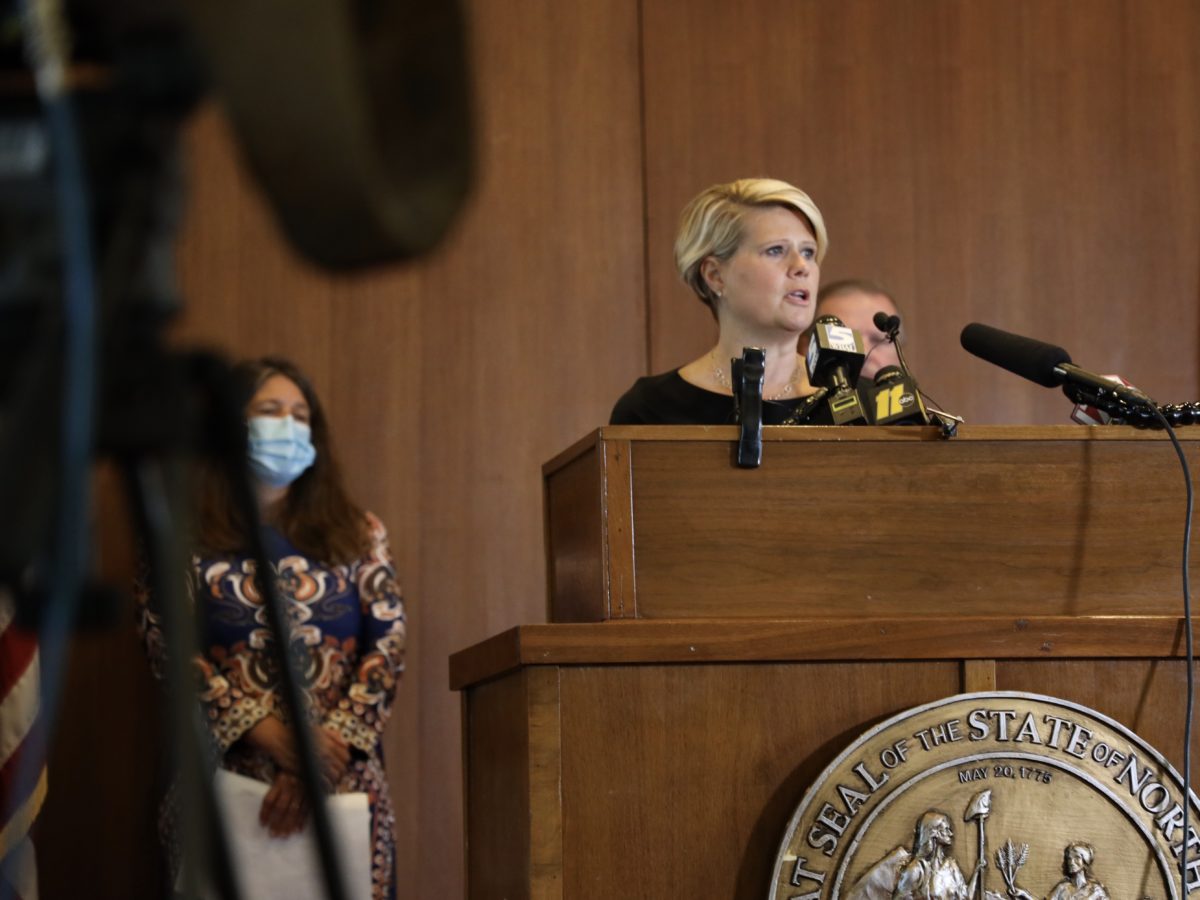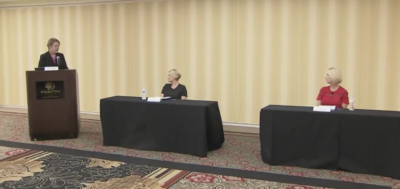
Republican leaders and candidates joined together with some parents today to call on Democratic Gov. Roy Cooper to offer an in-person option for K-12 schools.
Senate President Pro Tempore Phil Berger, R-Rockingham, Lt. Gov. Dan Forest, and Catherine Truitt, the Republican candidate for state superintendent of public instruction, held a press conference where they said Cooper needs to offer parents the chance to put their kids in school full-time five days a week.
“No reasonable person observing what’s going on would say the state of North Carolina is meeting its constitutional duty to provide these kids with a sound basic education,” Berger said.
Cooper announced in July that schools would have the option of either having a reduced number of students in schools, which generally means schools would be offering a combination of in-person and remote learning, or using all remote learning. Any parent who wanted their child to do virtual learning would also be provided that option. Most students started the year with some form of remote learning. Berger, Forest, and Truitt tried to lay out the case for why parents should have an option for full-time in-person instruction.
Berger said that in other states and countries, there are schools that are having students come to class full-time, and that so far they have avoided the outcomes from COVID-19 that some predicted. He also cited experts who talk about the importance to learning of having children in school.
“This is possible. It’s logistically challenging,” he said. “But I do not accept that we should abandon a child’s education just because the situation is challenging.”
Berger said that parents who want to have their kids learning remotely should continue to have that option as they do now. But parents who don’t should have the option of putting their kids in school.
In a release after the press conference, Senate Democratic Whip Jay Chaudhuri, Wake, and Senate Democratic Leader Dan Blue, Wake, criticized the press conference.
“The health and safety of our children, our educators, and families should not be politicized,” Blue said in a press release. “But that is exactly what we have seen from Republicans. Everyone wants to reopen our schools and economy. But we need strong leaders who will consider a careful approach to reopening that protects our community.”
Chaudhuri went on to say in the press release that everyone wants students in classrooms but that this desire must be balanced by the need to keep kids, teachers, and families safe.
“There is no perfect solution to this unprecedented public health crisis,” Chaudhuri said in the release. “School leaders need to consider appropriate safety practices for in-person learning, and how to manage the workload for staff who are juggling in-person and virtual classes.”
The release also criticized Republican lawmakers, saying that a COVID-19 relief bill from earlier this month didn’t include funding for school-based mental health and far less money for personal protective equipment (PPE) than requested by the governor and some state education leaders.
In response to a question about PPE funding and whether schools have enough resources to reopen, Berger pointed out that hundreds of millions of dollars have gone to school systems to help mitigate the impacts of COVID-19. He also said that many districts are seeing a decline in the number of students enrolled in schools without a subsequent decline in funding, thanks to a hold harmless passed this month by legislators. So, he said, districts should have some extra money to work with. The General Assembly comes back in January for the long session.
“If there are needs at that point, we will listen to what the needs are,” Berger said.
Forest, who is running against Cooper for governor in November, said during the press conference that it’s time to open classrooms back up. He said that North Carolina only recently got set up to have broadband for every classroom in the state to enable digital learning in the classroom. But doing that from home isn’t possible for thousands of children, he said.
Forest said that science doesn’t back up the notion that kids shouldn’t be in school. Meanwhile, there are a host of impacts to children from being stuck at home, including anxiety, depression, addiction, and child abuse.
“There are many reasons to move forward with opening the schools,” he said. “It needs to happen now, not January 1, not after election day. It needs to happen now so we can help our kids.”
In an email, Cooper spokesperson Ford Porter criticized the plan laid out by Forest, Berger, and Truitt.
“We all want to get our children back in school as soon as possible but we must follow the science and data and make sure we do so safely,” he wrote.
Truitt reiterated some of the points made by Berger and Forest, and added that special needs students as well as students living in poverty are disproportionately hurt by a reliance on remote learning. She also pointed out the large number of students operating below grade level in reading and math prior to COVID-19 and asked how much worse they would be faring after being outside of a classroom for so long.
“This is not about choosing between health and the economy,” Truitt said. “This is about recognizing that when classrooms stay closed, we are upholding one form of safety over another.”
Truitt’s opponent Jen Mangrum, the Democratic candidate for state superintendent, said during an interview that a push to reopen schools is premature, citing polls such as this one featured today on Diane Ravitch’s blog.
“I think that they are pushing this as a way to bully schools to open, when in truth that’s not what the majority of people think is what’s best for children,” she said.
She also brought up funding, saying that lawmakers hadn’t given districts enough resources, and that she knows some teachers are paying for their own PPE, some schools don’t have full-time nurses, and that if students on buses are going to be spaced out, more bus drivers will be needed.
The press conference also featured some parents of North Carolina students who shared their opinions and experiences with remote learning.
Tara Deane, a mother of four whose two youngest children were adopted from China and have special needs, said that when she adopted them she promised she would give them the best life possible.
“I have not even been able to give them a basic education or desperately needed therapies in the last several months,” she said.
Previously, these two children spent a full day of school in a self-contained special education classroom in Wake County where they had access to therapies and interventions. Now, they are at home.
She said that virtual learning can’t happen when your child can’t verbalize and won’t look at a screen. And because of their needs, the kids aren’t able to get any socialization outside of school. She said they don’t have friends or play dates, and she can’t just take them to a park.
Deane said one of her daughters who has become agitated over teletherapy and remote learning started mutilating herself — digging her nails into her arms and drawing blood. Deane had to put her on medication, which she said is something she never wanted to do.
“COVID isn’t killing my children right now, but they are dying inside,” she said.
Sandy Joiner, a mother of three sons, one of whom is a senior in Wake County, said remote learning has been damaging to her children, particularly the one in his last year of high school.
She said senior year is when a kid’s “social fabric” is strongest and that the isolation is wearing on him. School is more than just what you learn in a classroom.
“My son asks me every week, ‘Mom, when can I go back to school?’” she said.
She said there are ways to provide safeguards for students and to lower the risks associated with COVID-19.
“We should be able to do this in North Carolina,” she said. “I implore our leaders to find a way.”


